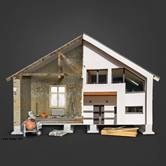Riyadh Province
Operational Costs - The Best 11 Steps to Reduce Costs

Operational Costs
Operational Costs - Introduction:
Clients need to know the operational costs of their real estate projects. It is an analytical process that aims to estimate and document all costs associated with the project’s operational operations, including the costs of labor, materials, equipment, energy, maintenance, and daily operation.
Therefore, in this article, we will provide you with advice to achieve the best financial return.
Article Content:
- How Do You Calculate Operational Costs?
- The Role of Building Rank in Improving Operational Costs:
- How Can Costs Be Reduced?
- A Cost-Cutting Move
First: How Are Operational Costs Calculated?
To calculate the costs of a construction project, you must take into account all the expenses that the project requires to get off the ground. Here are some of the main steps that can be followed:
- Construction materials costs: Includes the cost of purchasing basic materials such as cement, iron, concrete, bricks, glass, timber, insulation materials, etc.
- Labor costs: Include wages for direct and indirect workers involved in construction operations, such as contractors, craftsmen, technicians, and supervisors.
- Machinery and Equipment Costs: Includes purchasing, maintaining or leasing machinery and equipment needed for construction operations, such as excavators, cranes, trucks, hand equipment and construction tools.
- Fuel and energy costs: These include fuel consumption costs for equipment and machinery and electricity, gas and water consumption costs for construction operations.
- Rental costs and real estate expenses: If a building is rented to live in until the completion of construction work.
- Insurance costs: These include insurance costs for building equipment and materials, civil liability, and health insurance for workers.
- Administration and office costs: Include office costs, hardware, software, Internet, telephone, furniture, office supplies, and administrative fees.
- Transportation and public transportation costs: These include the costs of transporting construction materials, equipment, and labor to and from the construction site, in addition to the costs of general labor transportation.
- Maintenance and repair costs: Includes the costs of maintaining and repairing equipment, buildings, temporary structures, and emergency breakdowns.
- Waste Disposal Costs: These include construction waste disposal costs, recycling costs, and final cleanup after project completion.
- It is advisable to conduct a financial study: consult a financial professional or project manager to determine the specific operational costs of the project
These are just some of the common elements of construction project operational costs. You should keep in mind that these elements may vary based on the nature of the project, its location and individual circumstances.
Second: The Role of Building Rank in Improving Operational Costs:
Thanks to modern technology and the expertise of our engineers, and the use of the best fault detection devices, which aim to protect real estate properties, it has become easy to conduct all of our non-destructive checks in record time.
The inspection is carried out using advanced devices, and thanks to their experience, our engineers are able to inspect all areas of the building, regardless of the difficulties, and then deliver a comprehensive detailed report on all problems in addition to providing maintenance proposals, in addition to the estimated cost of these works, thus reducing the operational cost for a long time.
The Building Maintenance Status Report covers all the major elements of the building, identifies any problems and gives professional estimated costs for repairs, refurbishment and commissioning, all of which contribute to renegotiating the price of the property and agreeing the maintenance work required to provide peace of mind, or that the property does not suffer from immediate and obvious problems.
Understanding and studying operational costs before starting a project, in an estimated manner, gives you a clear vision, thus making informed decisions about assets, and identifying life cycle costs and tracking them throughout your facility paints a clearer picture of what the work requires.
Third: How Can Costs Be Reduced?
There are several effective ways that can help you reduce costs, as follows:
11 steps to reduce costs:
- 1. Cost Analysis: Conduct a comprehensive analysis of the expected costs of the project. Identify areas where savings can be achieved, and look for the most economical alternatives in terms of materials, equipment and labor.
- 2. Group contracting: Examine the possibility of working with a group contracting system, where the project is divided into several groups of small contractors instead of relying on one large contractor.
- 3. Alternative materials: Look for alternative materials that can be less expensive and still meet the required requirements. There may be less expensive and equally good options for cement, iron, insulators or other building materials.
- 4. Waste management: Take effective measures to manage and dispose of waste. It may be possible to recycle some construction materials or use them in other projects, reducing waste disposal costs and preserving the environment.
- 5. Preventive Maintenance: Implement an extensive maintenance program for the project's equipment and machinery. By paying attention to preventive maintenance and early diagnosis of faults, you can avoid major repair costs and project downtime.
- 6. Good project management: Organize and manage the project effectively, plan resources, schedules and work tasks in advance, and track progress and costs over time. This will help you avoid delays and excessive costs.
- 7. Negotiate and compare: Compare prices and offers from different suppliers and contractors before making purchasing and contracting decisions. You may be able to negotiate better offers and realize cost savings.
- 8. Invest in training: Develop your labor skills by providing continuous training and development. Skilled labor enables you to achieve better quality and greater achievements at lower costs.
- 9. Continuous review: Conduct analysis of financial data and reports, which can help you identify discrepancies and improve efficiency.
- 10. Reducing waste: Research and identify areas that can be improved to reduce waste, whether that is by improving production, improving inventory management, or improving transportation and delivery processes.
- 11. Use of technology: Technology can help improve business through integrated information systems and modern software to improve operations management and increase profits.
Remember that it is important to find the right balance between reducing costs, maintaining project quality and compliance with applicable standards and legislation. It is advisable to cooperate with a professional team specialized in financial project management to help you successfully achieve this balance.
Conclusion: Operational costs play a vital role in the health and sustainability of businesses, and managing them effectively contributes to improving operational efficiency, making financial decisions and taking measures to reduce or improve them and increasing profitability.
Do not hesitate to contact us

 العربية
العربية English
English 




Related Information:
Real Estate Evaluation - The 7 Most Important Steps to Evaluate the Property Price
property evaluation is a crucial process undertaken by Building Rank. The engineering team relies on a specific working mechanism to ensure the safety and quality of the property. This includes conducting a comprehensive inspection of the property and reliable analysis of the infrastructure and facilities connected to it. The evaluation aims to identify any problems or defects in the property and provide a detailed report that helps in making the right decisions about the property.
Read MoreWater leaks and Humidity in the Property - Inspection Points and Treatment
Learn with us about the most important points that the company examines, how to determine the causes of humidity without breaking the tiles and using the latest devices available at Building Rank Company, and how to prepare the report by the company’s engineers
Read More